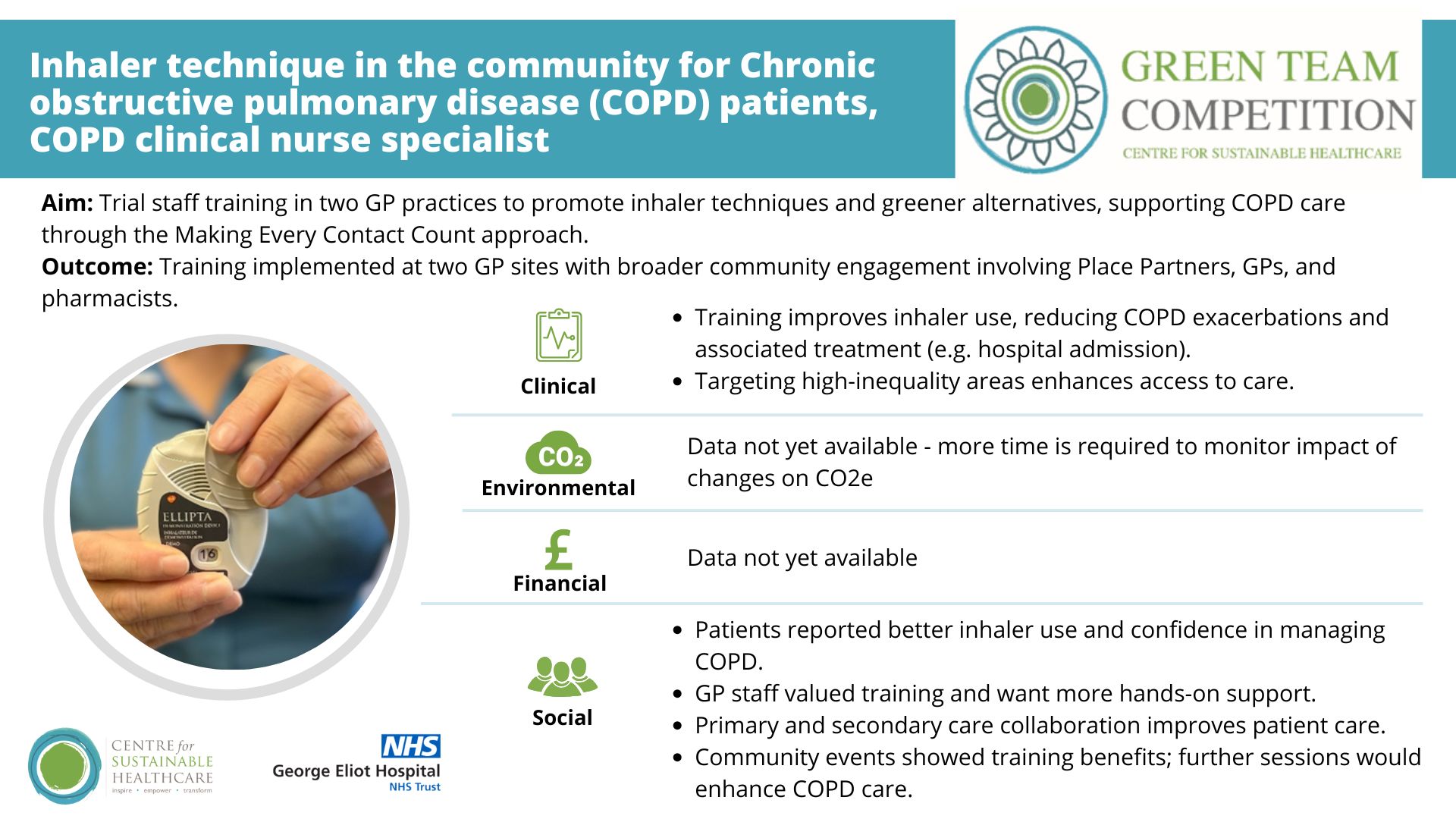Project completed as part of the 2024 Coventry and Warwickshire Green Team Competition.

Team members
- Lisa Taylor COPD clinical nurse specialist
- Jo Stewart - Project Manager, Strategy and Planning
Setting / patent group: Patients with COPD diagnosis
Issue:
Inhalers, particularly Salbutamol metered dose inhalers (MDIs), contribute 3% of the NHS carbon footprint, with MDIs being the largest source of emissions. At George Eliot Hospital (GEH), 95% of inhalers prescribed were MDIs, emitting significant carbon, while dry powder inhalers (DPIs) have a much lower environmental impact. Although DPI usage has increased, it still falls short of the NHS target of 30%. Incorrect inhaler technique among COPD patients exacerbates carbon emissions and health issues. The aim is to promote greener alternatives like DPIs and improve inhaler technique, reducing the carbon footprint and enhancing patient health outcomes by minimising unnecessary prescriptions and hospital admissions.
Aim: The project aims to improve sustainable inhaler usage for COPD patients by training staff in GP practices, sharing advice on inhaler techniques and greener alternatives, and rolling out training across local healthcare providers. The initiative aims to reduce COPD patient visits to acute settings and encourage a holistic approach to respiratory care within the community.
Intervention
The project focused on engaging with local GP practices, specifically Dordon Health Centre and Spring Hill Medical Centre, to promote the use of greener inhalers and improve inhaler technique for COPD patients. Training sessions were conducted for GPs, pharmacists, and practice nurses, providing updates on national guidelines, inhaler techniques, and the benefits of dry powder inhalers (DPIs) over metered dose inhalers (MDIs). Engagement with local clinicians was further extended through various community events, including Primary Care Network meetings and other healthcare forums. The project also shared resources like QR codes linking to inhaler technique videos and offered follow-up sessions with respiratory nurses.
Outcomes
- Staff at Spring Hill Medical Centre expressed an appreciation for the training, though they cited time and staff limitations as ongoing barriers to implementing best practices.
- The training helped improve GP staff confidence in assessing and training COPD patients on inhaler use, particularly at Spring Hill Medical Centre, where staff reported a stronger understanding of inhaler suitability.
- Both practices showed an interest in addressing patient resistance to change, with a focus on enhancing patient education and compliance.
- At George Eliot Hospital (GEH), patients trained by the COPD team felt more confident managing their condition, with a positive impact on their self-management, although the environmental impact concern was minimal.
- Patients at GEH reported greater confidence in managing their COPD, though concerns about environmental impact were limited.
- COPD patients attending pulmonary rehab also received useful information, which they could apply to their daily management.
- Feedback from community events, such as the Coventry and Warwickshire Training Hub and Warwickshire North Engine Room, indicated strong interest in continued education and the need for hands-on training tools (e.g., dummy inhalers).
- Participants from various clinical settings reported increased awareness of COPD management, the importance of appropriate inhaler use, and the environmental impacts of different inhaler types.
More time is required to measure environmentla and financial impacts of the project.
Key learning point
The key learning that came from this project was that there is interest and an appetite to learn more about sustainable care for COPD patients. Despite the short timeframes the team did manage to engage at several events, engage with patients and visit the two GP practices include in this survey. However, the short time for this project meant that measuring any changes following the project would take longer to see any visible change.
Another key learning outcome was that patients, pharmacists and clinicians do like to stick with the medicines they are used to using or prescribing and continued engagement is essential to provide the knowledge and understanding of different inhaler devices and the benefits to make that step change towards more sustainable inhaler health care but still continue to focus on getting the right inhaler for the patient.
Please log in or sign up to comment.